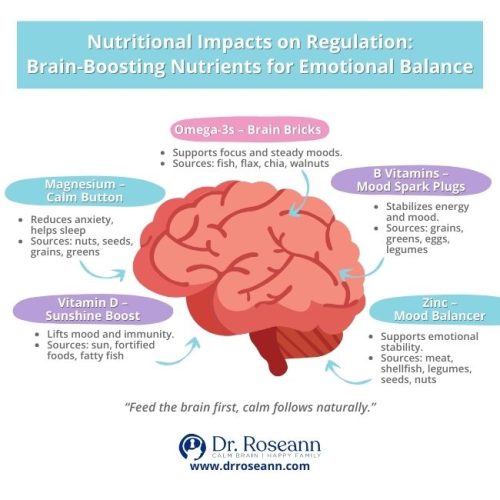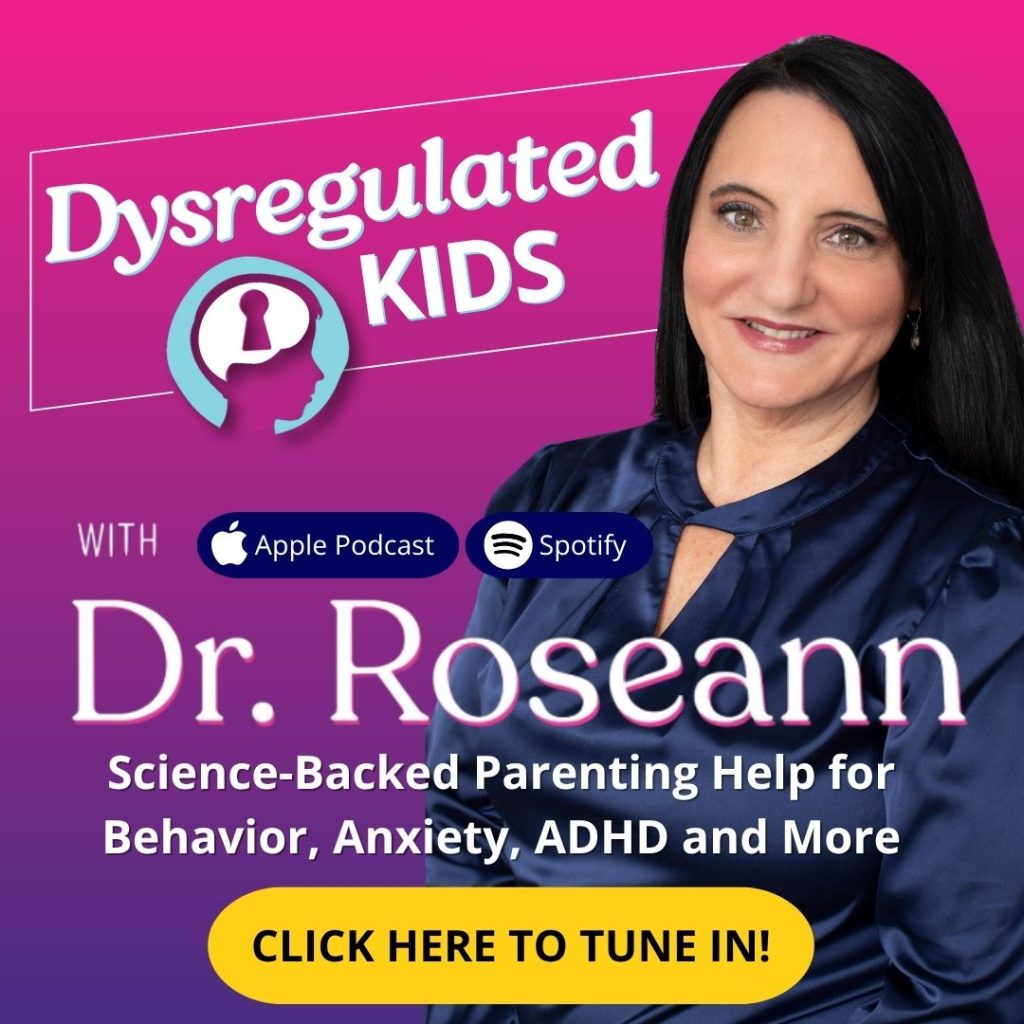Estimated reading time: 7 minutes
When every go-to strategy seems to stall out, it’s easy to wonder if calm will ever stick. Yet research continues to highlight an often-overlooked lever for change—nutrition.
The foods your child eats can either fuel stress or support regulation. Even small changes in diet can ripple through the nervous system, helping prevent emotional storms before they start.
I’ve watched families shift from constant tension to steadier days simply by making intentional, brain-friendly changes.
In this guide, we’ll explore the nutrients and eating patterns that act like skilled mechanics for a child’s emotional engine. Because here’s the truth—calm the brain first, and everything else begins to fall into place.
The Gut-Brain Connection: Understanding the Link
If your child’s mood or focus flips on a dime, you might be looking in the wrong place for answers. Sometimes, the real clue is in their belly.
People often say the gut and brain “talk,” and they really do—constantly sending chemical and nerve signals back and forth. I’ve seen kids’ moods brighten, their thinking sharpen, and their patience grow just by supporting gut health.
You might notice:
- A happier, calmer child when digestion is running smoothly
- More irritability or mood swings when the gut is off balance
- Less stress reactivity when they’re eating more whole foods and getting probiotics
Researchers now know a thriving gut microbiome doesn’t just help digestion—it supports emotional balance and stress recovery too (Cryan et al., 2019). When you nurture your child’s gut, you’re not just easing a rough day… you’re giving their brain the calm it needs to thrive.
Supplementary Reading: Different Causes of Dysregulation in Kids
Key Nutrients That Support Emotional Regulation
Small changes in nutrition can bring surprisingly big wins for a growing brain. When a child’s nervous system feels steadier, their mood and focus often follow.
Here are a few powerhouse nutrients that can help calm the brain and nurture emotional regulation.

1. Omega-3 Fatty Acids: The Brain’s Building Blocks
If your child’s moods swing like a pendulum or focus feels out of reach, picture this: their brain is trying to build strong connections with missing pieces.
- Omega-3s — especially EPA and DHA — are premium bricks for your child’s brain. Without enough of them, the “house” isn’t as sturdy.
- They help dysregulated brains stay steady and connected.
What they do:
- Support brain cell communication
- Reduce inflammation that fuels mood swings
- Low levels have been tied to depression, anxiety, and ADHD (Gómez-Pinilla, 2008)
Sources:
- Fatty fish (salmon or mackerel)
- Flaxseeds
- Chia seeds
- Walnuts
2. B Vitamins: Mood and Energy Spark Plugs
Ever notice your child come home from school wired one moment and wiped out the next? That brain might be running without enough spark.
B vitamins are like those tiny spark plugs that keep the emotional engine humming instead of sputtering out.
What they do:
- B6, B12, and folate help produce mood-balancing brain chemicals
- Keep energy production steady
When levels are low, you might see:
- Irritability
- Fatigue
- Trouble focusing
Where to find them:
- Whole grains
- Leafy greens
- Eggs
- Legumes
3. Magnesium: The Brain’s Calm Button
If your child can’t seem to “turn off” at night, magnesium might be the missing calm switch. Picture the brain as a busy control center — magnesium helps dim the lights when it’s time to rest.
What they do:
- Supports over 300 body processes, many tied to mood and relaxation
- Helps the nervous system shift out of fight-or-flight mode
What it supports:
- Less anxiety
- Better sleep
- Emotional steadiness
Sources:
- Nuts
- Seeds
- Whole grains
- Leafy greens
4. Vitamin D: More Than Bone Health
If your child feels “blah” even on good days, the sunshine vitamin might be running low.
Nicknamed the “sunshine vitamin,” vitamin D doesn’t just lift bones but moods too.
What they do:
- Supports immune health and healthy brain chemistry
- Low levels linked to depression and low mood (Ganji et al., 2020)
Sources:
- Sunlight
- Fortified foods
- Fatty fish
5. Zinc: The Mighty Mood Balancer
Small but powerful. Zinc is essential for emotional stability.
What they do:
- Supports healthy neurotransmitter function
- Helps stabilize mood and support emotional balance
- Deficiency linked to anxiety and depression
Sources:
- Meat
- Shellfish
- Legumes
- Seeds
- Nuts
The Impact of Diet Patterns on Emotional Health
Ever notice mornings feel like a storm before your child even opens their eyes? Tiny tweaks in meals—even one extra veggie or swapping refined grains—can calm frazzled nerves and help focus settle like sunlight breaking through clouds.
1. Whole-Food Diets: Foundation for Stability
Picture the brain as a construction site; without sturdy materials, pathways wobble and cracks appear. Foods that build solid connections include:
- Fruits
- Vegetables
- Lean proteins: chicken, fish, beans, eggs
- Whole grains: brown rice, oats, quinoa
Even one small change can nudge energy and mood, sometimes surprisingly fast. Research by Jacka et al. (2017) shows children eating nutrient-rich meals often have fewer emotional spikes.
Feeding the brain quality fuel is like handing it a toolkit for calm, resilience, and sharper focus.
2. The Dangers of Processed Foods
Imagine trying to build a sandcastle during a gusting windstorm—that’s a brain overloaded with:
- Refined sugars
- Unhealthy fats
- trans fats
- excess saturated fat
- Artificial additives
- colorings
- flavorings
- preservatives
Repeated exposure scrambles brain chemistry and makes focus hard to maintain (Rucklidge & Kaplan, 2013). Tiny frequent indulgences act like hidden leaks gradually eroding emotional steadiness and eventually stacking into noticeable instability.
3. The Role of Elimination Diets
Sometimes the trouble isn’t what’s missing but what sneaks in. Hidden sensitivities can trigger:
- Irritability
- Anxiety
- Meltdowns
Common culprits include:
- Dairy
- Gluten
- Soy
- Eggs
- Certain dyes or preservatives
Guided elimination often reveals hidden offenders. Remove them, and your child may become calmer and more focused—like lowering the volume in a noisy room. As I always say: calm the brain first, and everything follows.
Practical Strategies for Parents
- Offer nutrient-rich meals. Fruits, greens, proteins, and whole grains fuel focus and steady moods.
- Reduce Processed Foods. Cut sugary snacks—they sneak chaos in and spark meltdowns.
- Observe Food Reactions. Notice moods after meals; hidden triggers often whisper before they shout.
- Try little tweaks. One extra veggie, a grain swap, or a handful of nuts can gently boost energy and focus.
- Use a Food Diary. Logging meals and moods shines a light on patterns you might otherwise miss.
- Consult Professionals. Pediatricians or nutritionists guide nutrient gaps, safe supplements, and reduce guesswork.
- Create Calm Mealtimes. Eat together distraction-free and keep interactions gentle—small habits ripple into the day.
Calming the brain first helps learning and behavior naturally follow. Explore the Dysregulation Solution for lasting focus, calm, and emotional balance.
FAQs
How Does Hydration Affect Emotional Regulation in Children?
Water plays a quiet but powerful role in mood and focus. Even mild dehydration can increase irritability, fatigue, and difficulty concentrating. Encouraging regular water breaks throughout the day helps the brain stay alert and calm, supporting steady emotional regulation alongside a nutrient-rich diet.
Can Certain Spices or Herbs Support Brain Health?
Yes, flavors like turmeric, cinnamon, and rosemary may have mild anti-inflammatory and antioxidant effects that support brain function. While they aren’t a cure-all, sprinkling these into meals can subtly support focus, mood, and overall nervous system balance—plus, they make meals more flavorful and enjoyable for kids.
How Does Meal Timing Influence Behavior and Focus?
Consistent meal and snack times help regulate blood sugar and prevent energy crashes that trigger irritability or meltdowns. Structured routines create predictability, which calms the nervous system. Pairing nutrient-dense foods with balanced timing can improve attention, emotional stability, and help your child navigate their day with more ease.
Citations
Cryan, J. F., O’Riordan, K. J., Cowan, C. S. M., Sandhu, K. V., Bastiaanssen, T. F. S., Boehme, M., Codagnone, M. G., Cussotto, S., Fulling, C., Golubeva, A. V., Guzzetta, K. E., Jaggar, M., Long-Smith, C. M., Lyte, J. M., Martin, J. A., Molinero-Perez, A., Moloney, G., Morelli, E., Morillas, E., O’Connor, R., … Dinan, T. G. (2019). The Microbiota-Gut-Brain Axis. Physiological reviews, 99(4), 1877–2013. https://doi.org/10.1152/physrev.00018.2018
Ganji, V., Milone, C., Cody, M. M., McCarty, F., & Wang, Y. T. (2010). Serum vitamin D concentrations are related to depression in young adult US population: the Third National Health and Nutrition Examination Survey. International archives of medicine, 3, 29. https://doi.org/10.1186/1755-7682-3-29
Gómez-Pinilla F. (2008). Brain foods: the effects of nutrients on brain function. Nature reviews. Neuroscience, 9(7), 568–578. https://doi.org/10.1038/nrn2421
Jacka, F. N., O’Neil, A., Opie, R., Itsiopoulos, C., Cotton, S., Mohebbi, M., Castle, D., Dash, S., Mihalopoulos, C., Chatterton, M. L., Brazionis, L., Dean, O. M., Hodge, A. M., & Berk, M. (2017). A randomised controlled trial of dietary improvement for adults with major depression (the ‘SMILES’ trial). BMC medicine, 15(1), 23. https://doi.org/10.1186/s12916-017-0791-y
Rucklidge, J. J., & Kaplan, B. J. (2016). Nutrition and Mental Health. Clinical Psychological Science, 4(6), 1082-1084. https://doi.org/10.1177/2167702616641050
Always remember… “Calm Brain, Happy Family™”
Disclaimer: This article is not intended to give health advice and it is recommended to consult with a physician before beginning any new wellness regime. *The effectiveness of diagnosis and treatment varies by patient and condition. Dr. Roseann Capanna-Hodge, LLC does not guarantee certain results.
Are you looking for SOLUTIONS for your struggling child or teen?
Dr. Roseann and her team are all about science-backed solutions, so you are in the right place!











